Wondering what the differences are between red dots and holographic sights? Want to find out which is best for you?
Well, read on, because we’re going to get into the details of the differences between these two sight technologies and help you understand how they work so you can figure out which one meets your needs best.
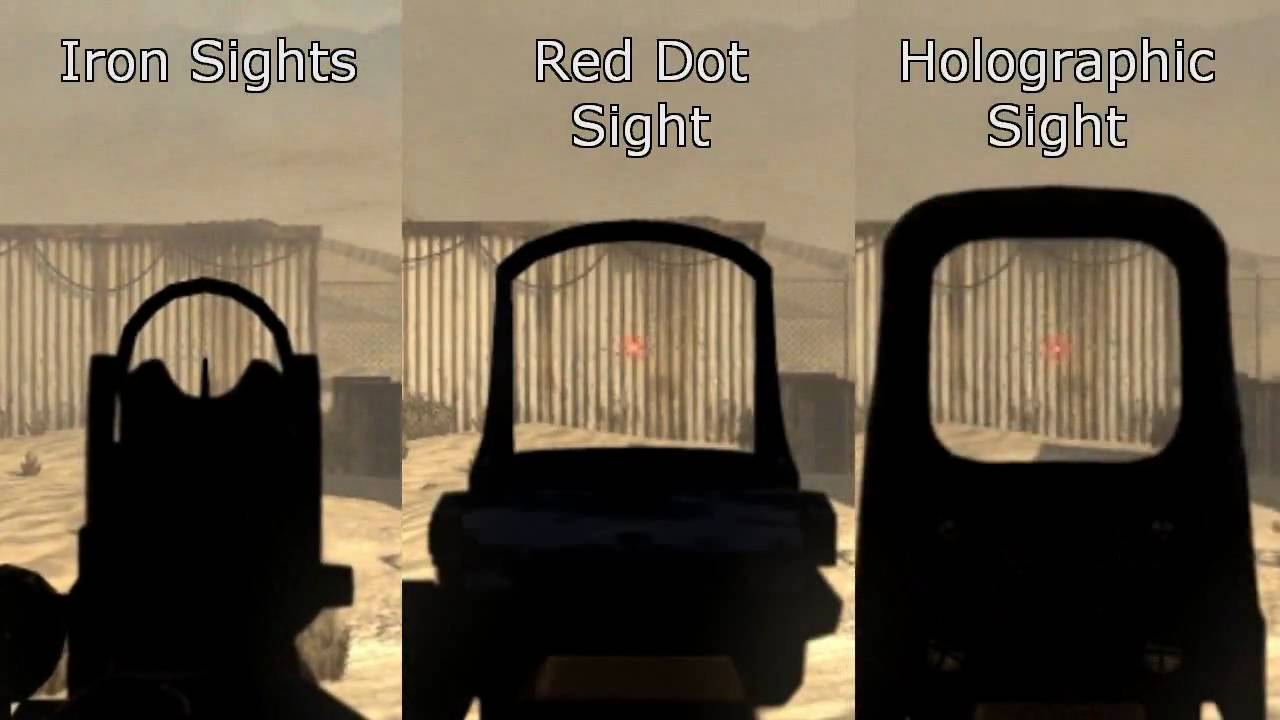
Now, let’s jump in!
How Red Dots and Holographic Sights Work
First up–what’s the difference in technology between red dots and holo sights? Is it really as simple as what the reticle looks like, or is there more to it?
Well, you may have noticed that there tends to be a size difference between the two types of sights, and it turns out, there’s a pretty good reason for that. Let’s take a look inside…
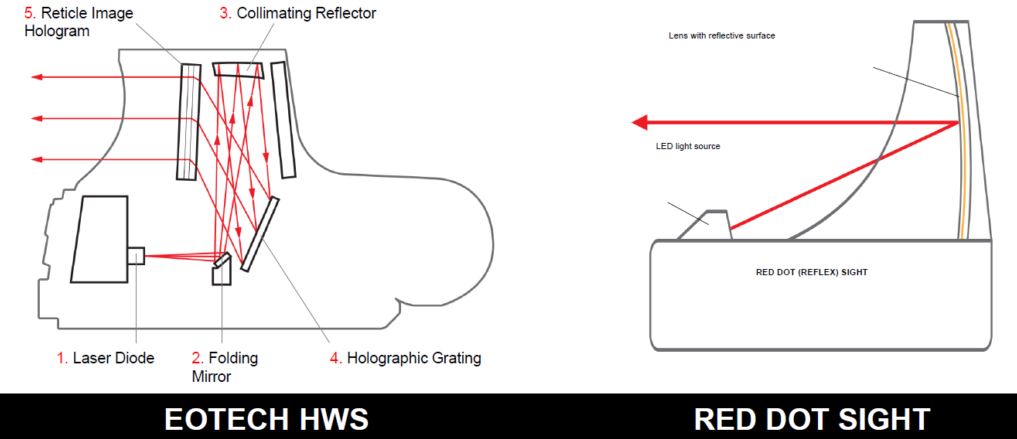
As you can see from the graphic above, holographic sights have a lot more going on inside. Red dots simply have an LED emitter that bounces a beam off the specially coated front glass and back towards your eye.
Holographic sights, on the other hand, use a complex set of mirrors to bounce a laser around and send a hologram back to your eyes. It doesn’t need the front glass to produce a hologram, but it may look like it does.
Unlike traditional scopes, both red dots and holographic sights don’t give really noticeable a parallax effect. Parallax is the effect where the position or direction of an object appears to change as you look at it from different positions.
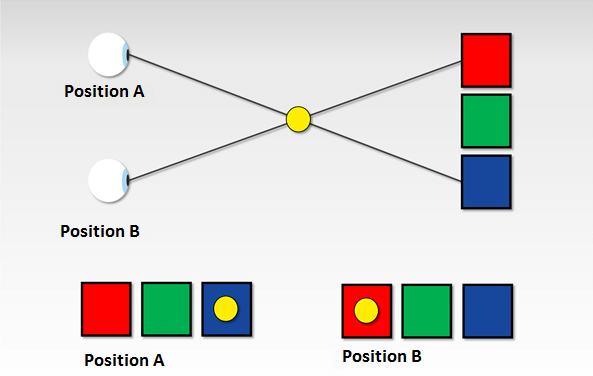
Typically, you will adjust a scope to combat parallax by changing the focus knob. What you are doing when you do this is not actually focusing the scope, but actually moving the reticle into line to correct parallax and put you on target.
Holographic scopes and red dots are not parallax-free, as commonly believed (and advertised), but rather they are zeroed to infinity. What that means is that there’s a lot less error, so they appear to be parallax-free. You might notice a parallax shift at closer ranges, however.
Price
Unfortunately for those of us on a budget, with more complicated technology comes a heftier price tag.
Decent red dots can be found for less than $50 (see the best red dots under $100), but the better ones tend to run you between a hundred and two hundred bucks–still a steal compared to where holographic sights start off.
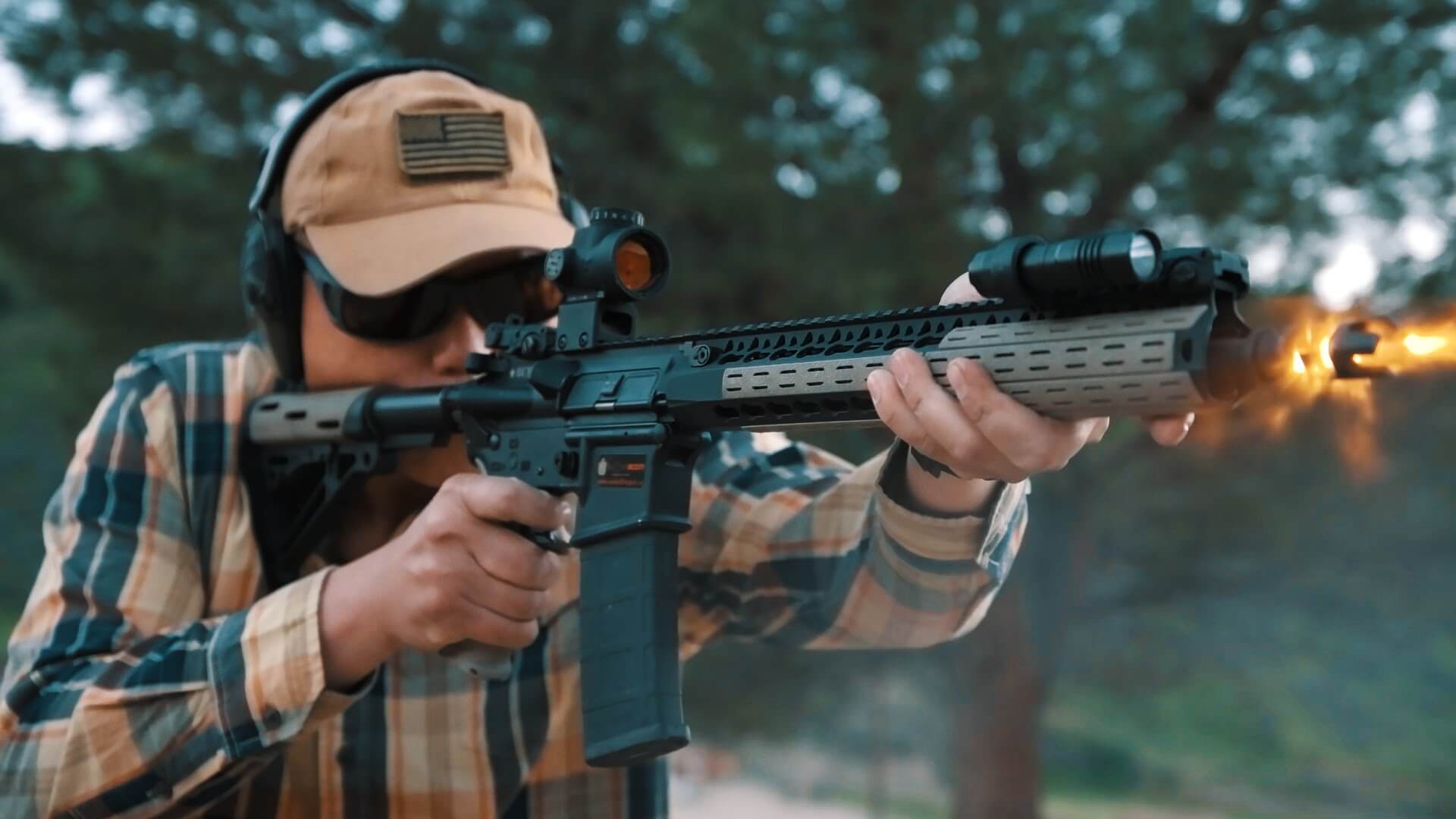
their affordable price.
There is also a lot more variety when it comes to red dots, since pretty much every optics manufacturer has tried their hand at them. Of course, having too many options can be a pain too, so may we humbly suggest our favorite, the Holosun HS403A.
If you need a red dot that will go to hell and back without failing, you’re going to want the Aimpoint PRO, which will run you about $400. We promise, though–it’s totally worth it.
Even though everyone and their brother makes red dots, there are only two companies that make true holographic sights: EOTech and Vortex.
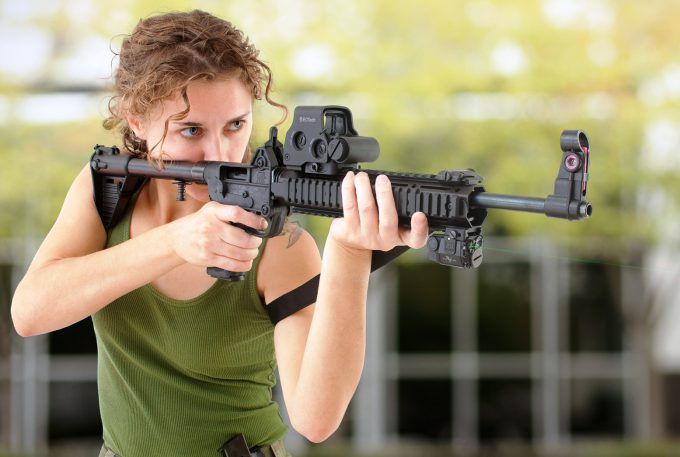
EOTech is a well-known name in optics and is popular with our military because of their exceptional sights, but newcomer Vortex has been plenty promising too.
Both companies start their holographic sights at about $400, which is about the same price as the super-tough Aimpoint Pro we’re so fond of.
Is it worth it? Well, let’s see!
Best Priced Sights: Red Dots (affordable to pro-level optics and pricing to match)
Size
As it turns out, size does matter!
If you’re looking for an optic for your pistol, you’re going to want a smaller option, and you’re only going to find that in the red dots. Because the technology is so much simpler, there’s quite a few options that will work on pistols and rifles (read about the best pistol red dots here!).
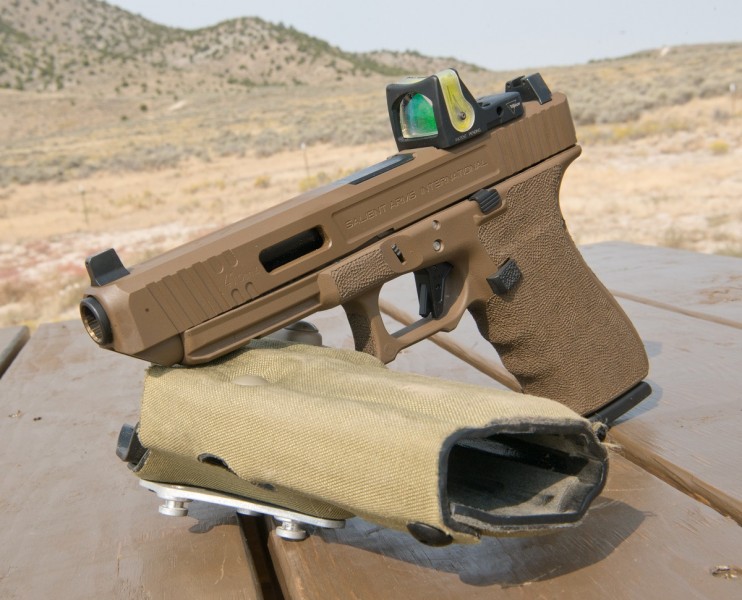
Holographic sights aren’t huge, but you definitely won’t want to slap one on top of your handgun, no matter how cool they are. These sights are best for rifles, and they will take up a good chunk of your top rail, so be aware.
Best Sized Sights: Red Dots
Durability
When it comes to durability, you get what you pay for. Top-of-the-line models from either category both have some pretty amazing stories of standing up to incredible abuse and still ticking along.
So, in short–if you want bombproof optics, be prepared to drop a good chunk of change on it. It can be comforting to know that your sights can withstand a huge range of temperatures, water depths, g-forces, and other abuse, and just keep going.
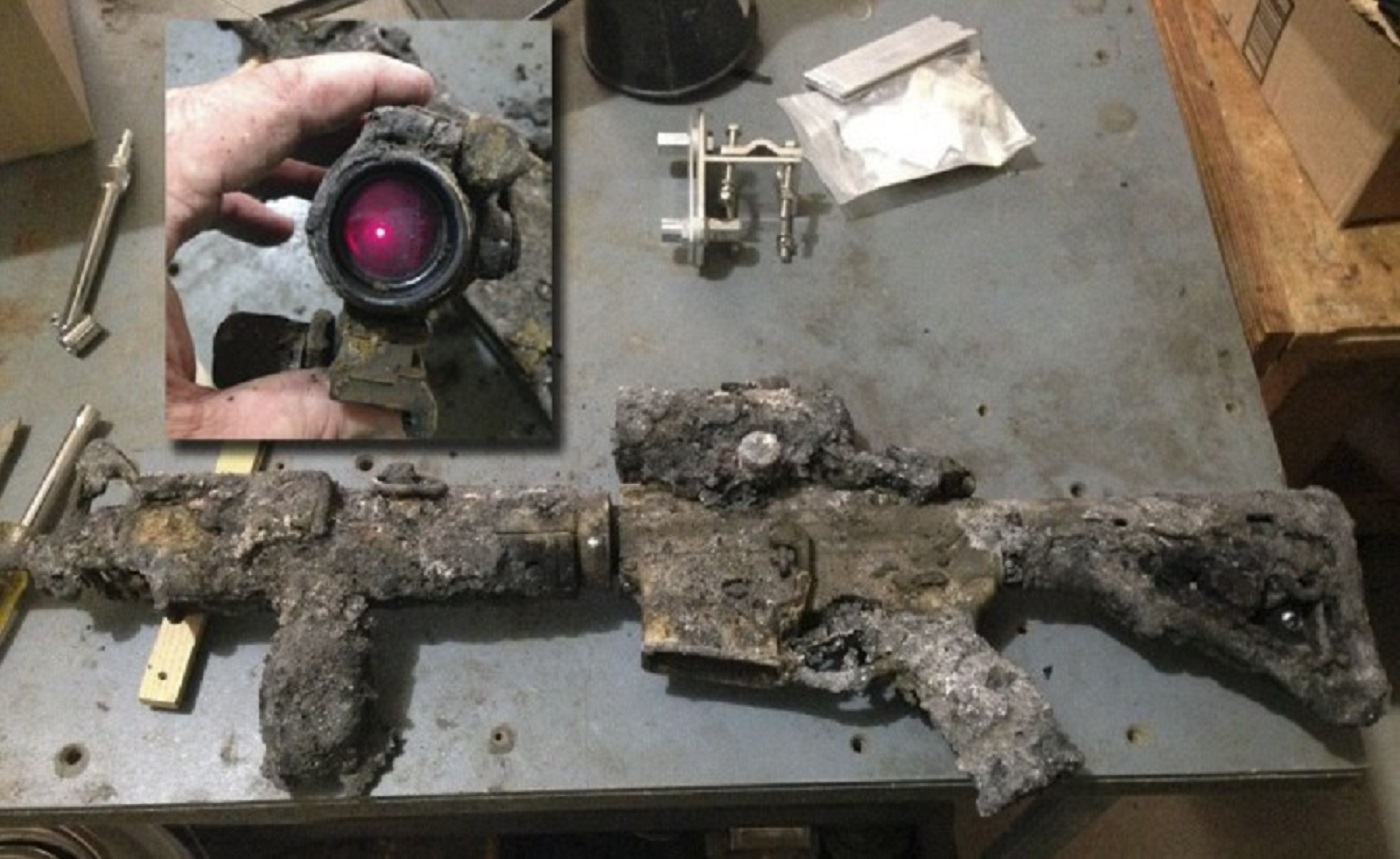
Cheaper red dots are great for your safe queen or range plinker (or airsoft gun), but they won’t take too much real-life abuse.
Remember how we just mentioned that holographic sights didn’t need their front window to work? Well, guess which option will keep going if you get hit with frag from the front?
That’s right–holo sights. As long as you have a view through the sight–glass or not–you have a reticle. These sights will even stay zeroed if the window is partially obscured. Pretty useful, right?
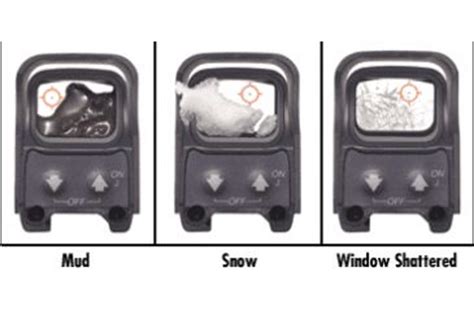
Best in Durability: Holographic Sights
Power and Battery Life
Red dots rely on the power-saving technology of LED, while holographic sights require a laser to produce their holograms, and it makes a big difference when it comes to your battery life.
Some red dots have a run time of up to 50,000 hours of continuous on-time. That’s more than 5 years of 24/7 run time.
Holographic sights, though, usually come somewhere in the 500-1,000 hours range of battery life. So, if you’re looking for a set it and forget it option, red dots will stand you in good stead.
Best Battery Life: Red Dots
Field of View
Electronic sights are hailed for their ability to work with both eyes open, giving you a better field of view and situational awareness.
Smaller sights, like pistol red dots, have a smaller window, which means you may need to line it up with your eyes more in order to get a good sight picture.
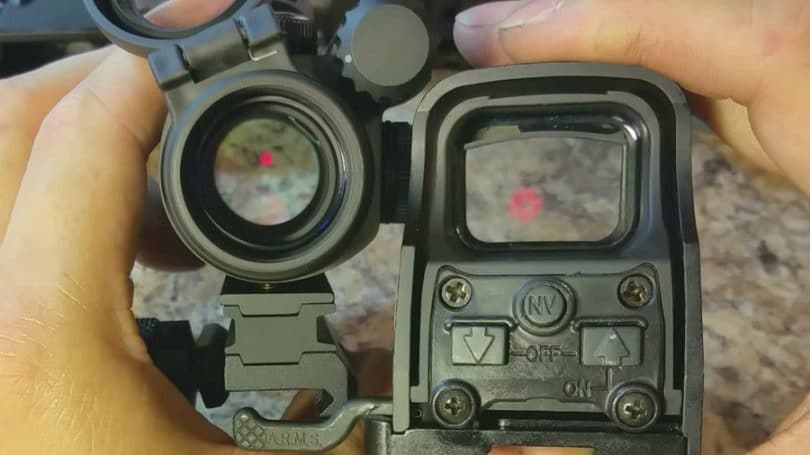
Bigger red dots often come in the popular tube style, which narrows your field a bit compared to a holographic sight, but makes it very easy to quickly pick up a sight picture.
Holographic sights have a rectangular field of view, which offers a good picture, a great field of view, and a very fast sight picture.
While pretty much any option will give you a wide FOV, we think that the holographic sights offer the best one.
Best FOV: Holographic Sights
Reticles: Color and Style
So, since the thing you’re going to be staring at most is your reticle… let’s take a look at the specifics of that.
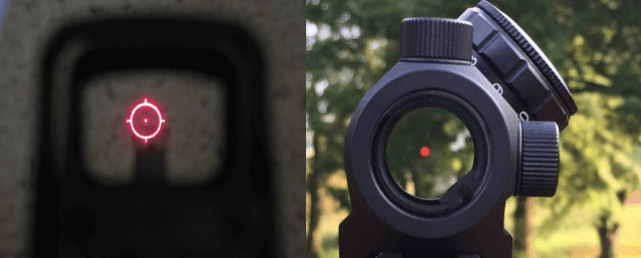
Reticle Color
Reticles pretty much come in two colors: red and green. Red is by far the most common, since it’s easily picked up by the eyes, even in changing lighting situations, such as moving through a building.
Green is becoming more popular, especially among competition shooters, since it’s even easier on the eyes than red. Green reticles, however, are best when used in steady lighting.
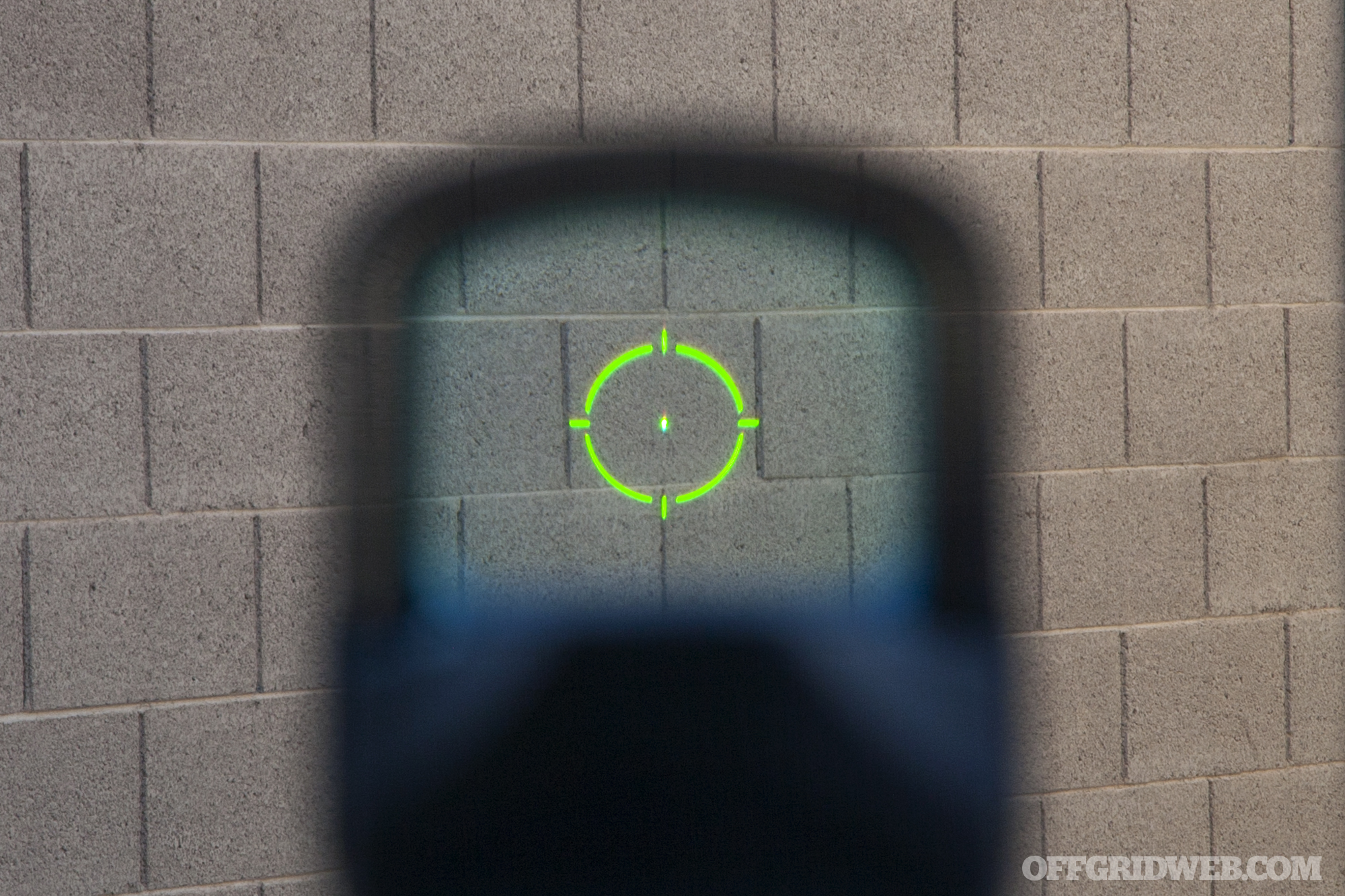
Reticle Pattern
Your reticle may be as simple as a small dot, or it may include a ring, crosshairs, or some combination of all three. It’s pretty common to find red dots with only a dot, but there are some that mimic the holographic sights’ reticles with a ring around the dot.
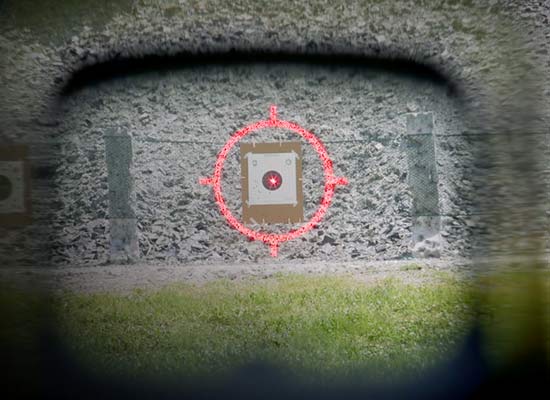
It’s worth noting that the smallest red dots only get down to 2 MOA, while the center dot of the EOTech Speed Ring reticle is 1 MOA. What does this mean?
It means that, at 100 yards, the dot will cover 1 inch, compared to the red dot’s 2 inches. At 200 yards, the EOTech dot will cover 2 inches instead of 4 inches.
If you’re a fan of that reticle style and the battery life of red dots, we recommend the Holosun 501C. It’s a red dot that features a holo sight-style reticle, so you get the best of both worlds.
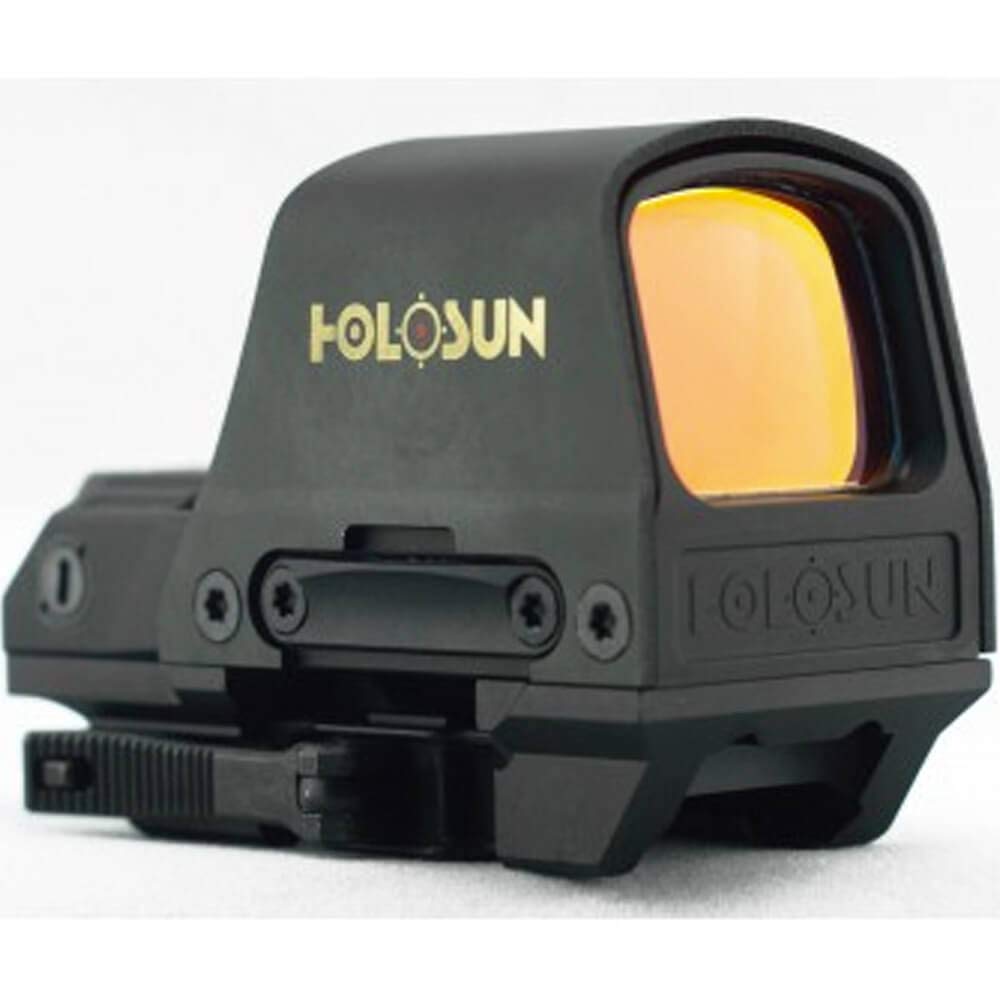
Holosun 501C
Pros
- Holographic-style reticle
- Long battery life
- Durable design
Cons
- No holographic projection
Best Reticles: Tie!
Acquisition Speed
There’s no denying that both red dots and holographic sights are faster than traditional iron sights, but remember the differences between the technology inside each electronic sight?
Red dots focus the dot to your eyes, so the focal distance is the sight itself. Holographic sights do that weird thing where they project the hologram out in front of the sight itself.
Why am I telling you this?
Because your eye can only focus on one thing at a time, and if you have to choose between focusing on the red dot that’s close, or the target that’s far, you’re going to lose time picking up your sight picture.
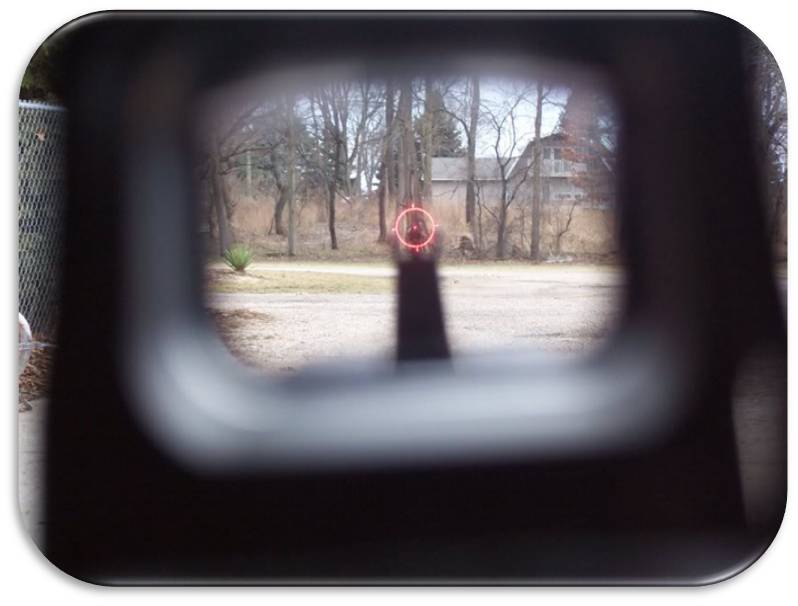
On the other hand, holographic targets superimpose the reticle on your target, so you’re only focusing on one distance.
Not to mention, that handy Speed Ring reticle makes it easy for quick closeup shots or more accurate distance shots using the 1 MOA center dot.
Best for Acquisition: Holographic
Night Vision
You can find night vision compatible models in both red dots and holographic sights. These models have dimmer settings to avoid damaging night vision devices.
Best Night Vision Options: Tie!
Magnification
You can use a magnifier with both red dots and with holographic sights, but holographic sights are definitely better suited to magnification.
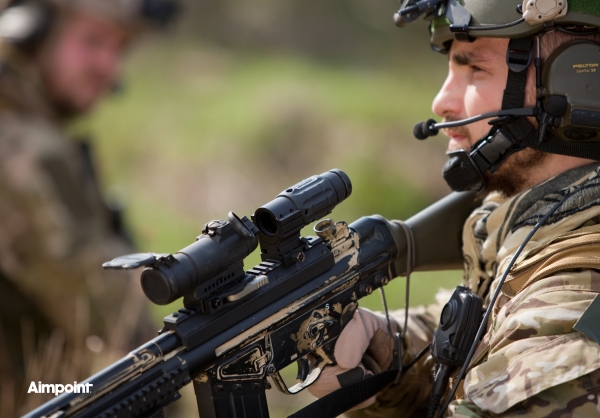
When using a red dot with a magnifier, the size of the dot will appear larger, but remain proportionally the same when compared to the target. The holographic sight, however, will remain the same, regardless of magnification. The more you magnify the target, the smaller the reticle will appear in proportion to the target.
Best Magnification: Holographic Sights
Does Astigmatism Affect Sights?
If you have astigmatism, or nearsightedness, a red dot will probably look like a starburst or a squiggly shape when you sight in, because you’re focusing beyond the focal plane of the dot.
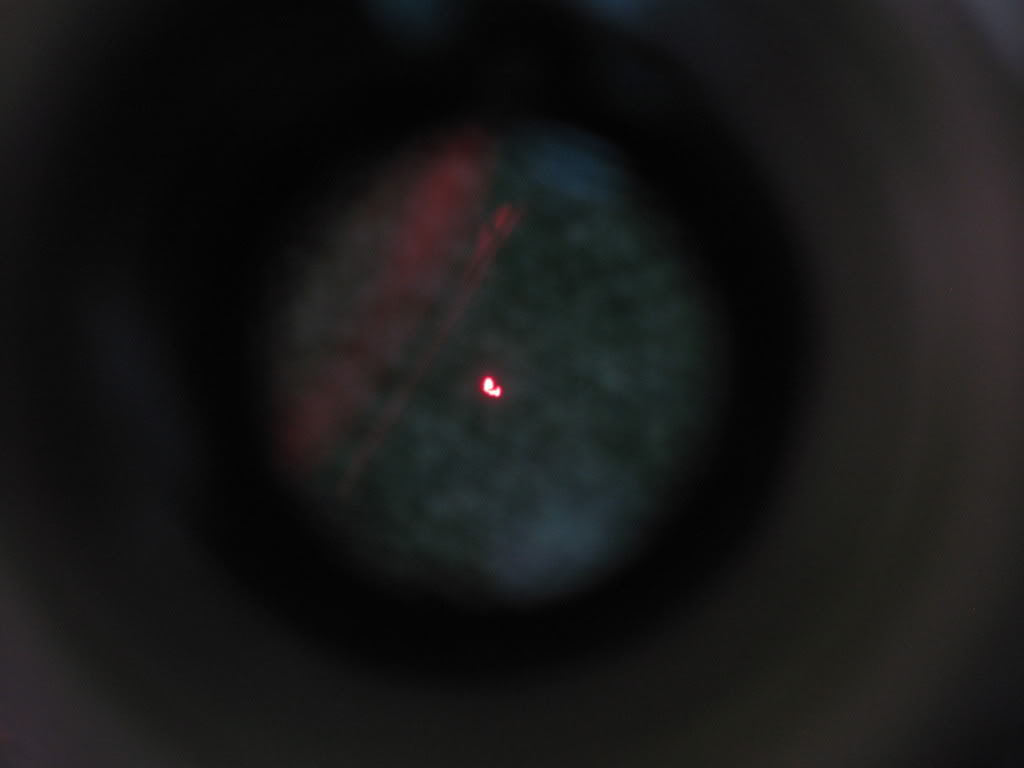
Holographic sights superimpose the reticle over the target, which means the reticle is in focus when the target is, so you won’t have the same issues with blurry reticles that red dots can cause.
Best for Astigmatism: Holographic Sights
Our Favorite Red Dot and Holo Sight
There are some definite benefits to holographic sights, as seen above, but the price of entry is so much steeper than it is for red dots that it may not be worth it to you.
If you still want a holo sight and are ready to spend some money on a good one, we recommend the EOTech EXPS 2-0. You can find it for around $450, which is on the lower end of what holographic sights run.
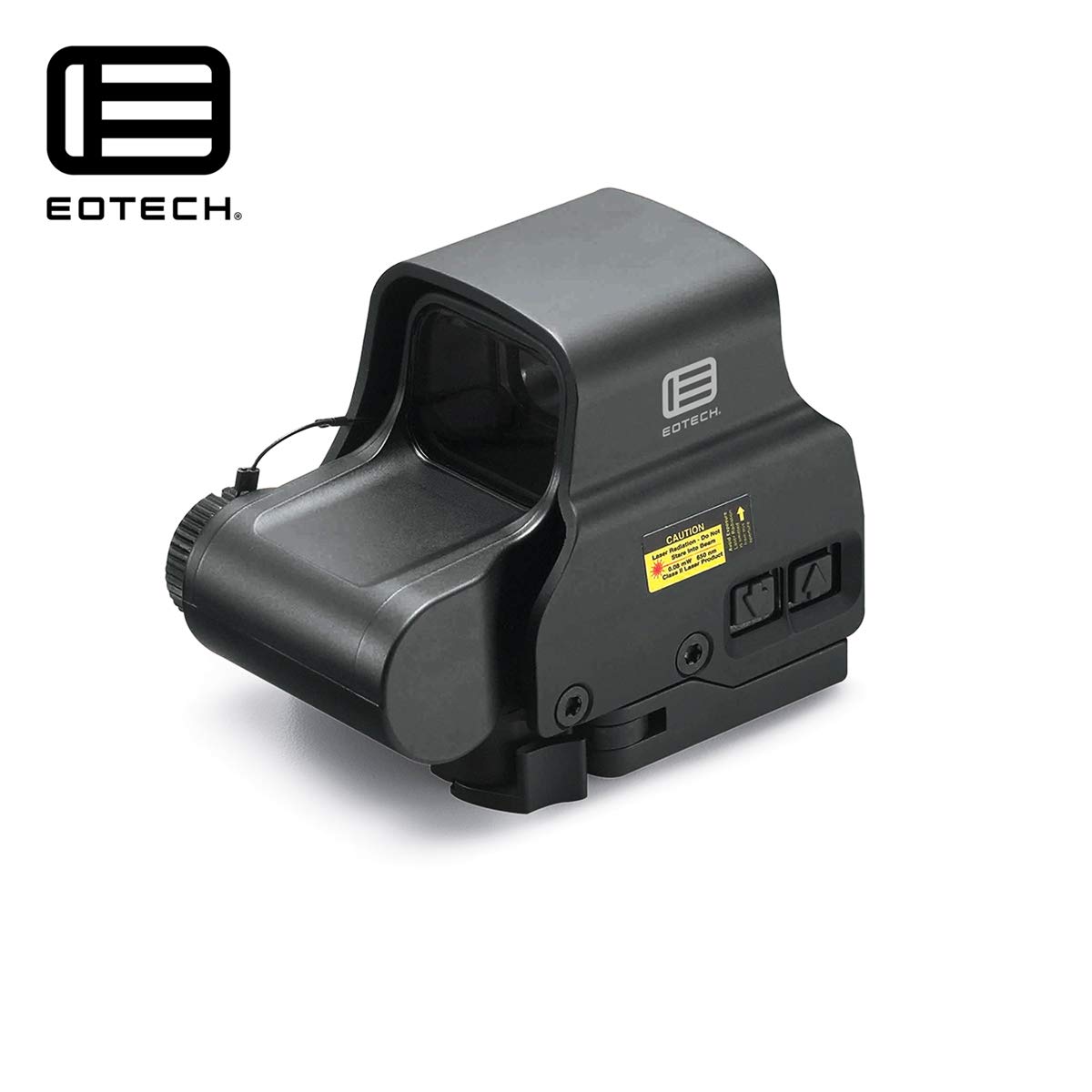
EOTech EXPS 2-0
Pros
- Holographic technology works, even when obstructed
- Easy to pick up targets with
- Extremely durable and tolerant of bad conditions
Cons
- Expensive
With EOTech’s reputation for excellence, we’re pretty sure you won’t need that 10-year warranty, but this sight comes with it anyway.
If you’re new to electronic sights and aren’t sure where to start, it’s hard to go wrong with a red dot, especially the Holosun HS403A. It’s under $200, so it’s much more friendly for your budget than a holographic sight.
You’ll get a super-long battery life, and the auto-on feature keeps your red dot ready to go when you are while saving battery when not in use.
Holographic sights might make shooting magnified a little bit easier or help you pick up a target more quickly, but ultimately, it’s up to you if the extra cost is worth it.
What do you think? Are holographic sights worth the cost? Have any recommendations? Tell us about it in the comments. While you’re here, check out the best AR-15 optics!


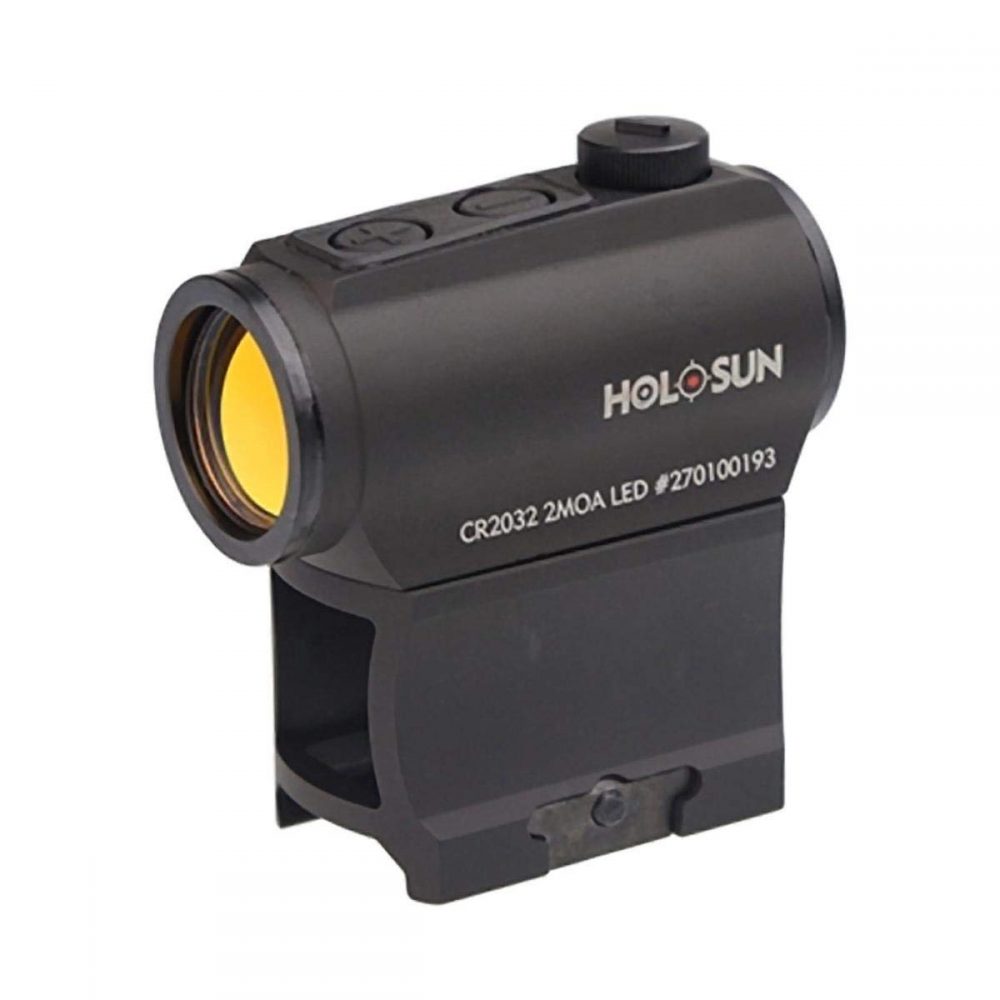
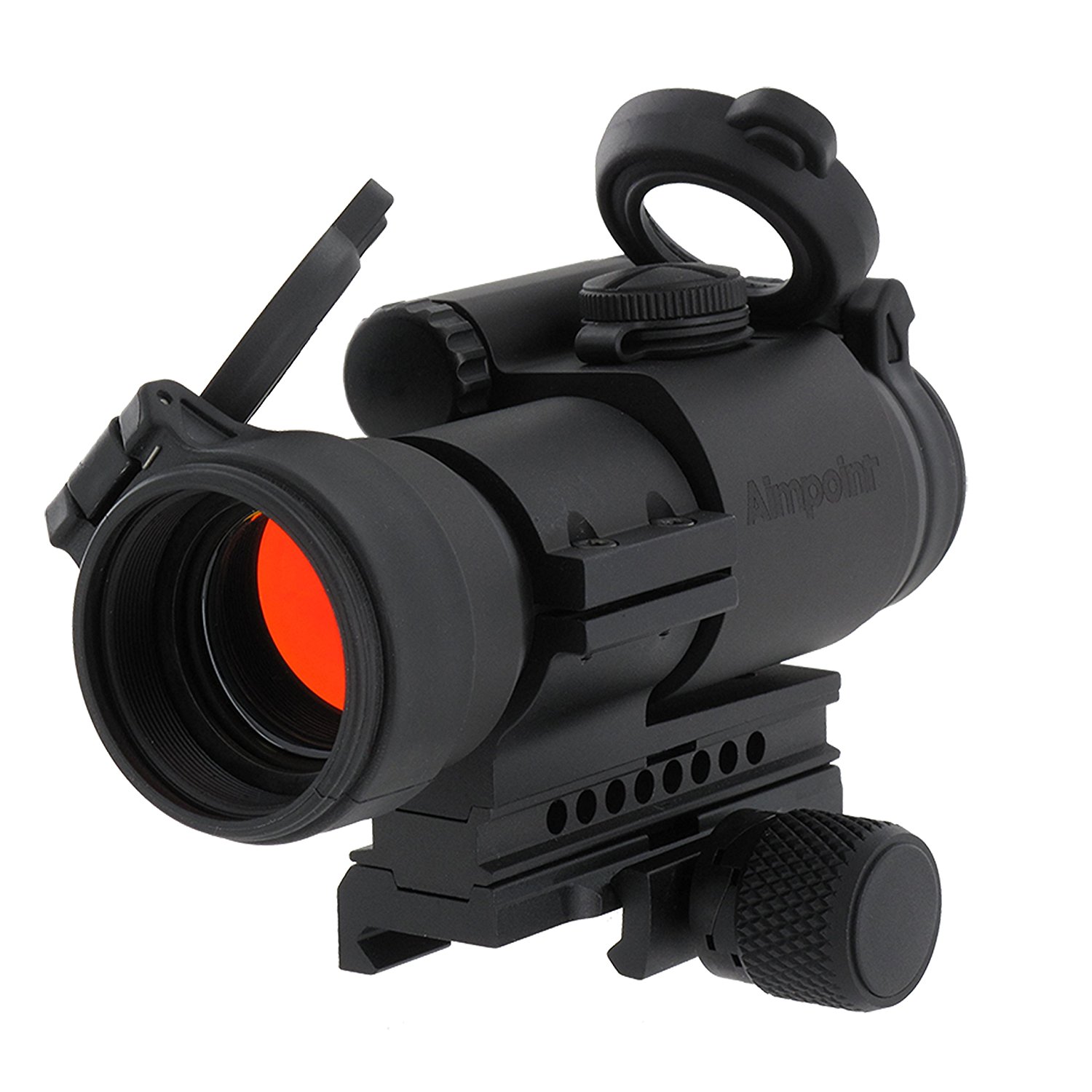
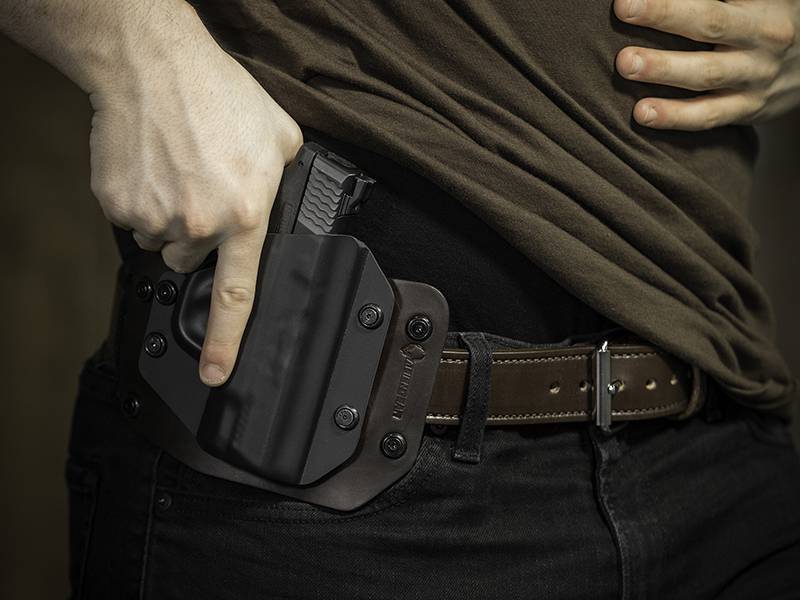
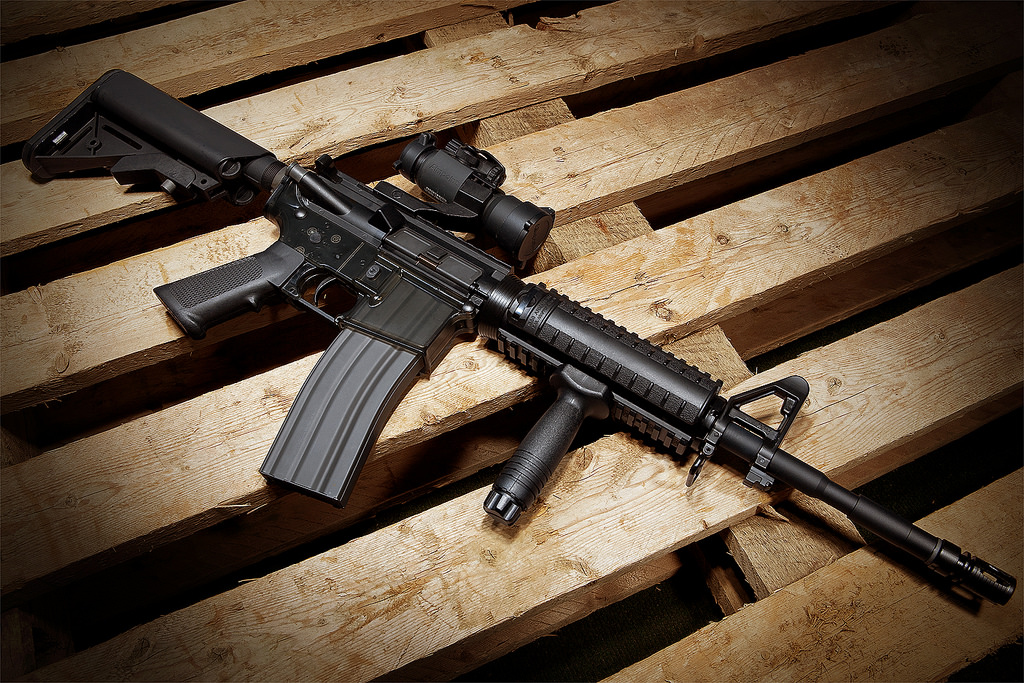
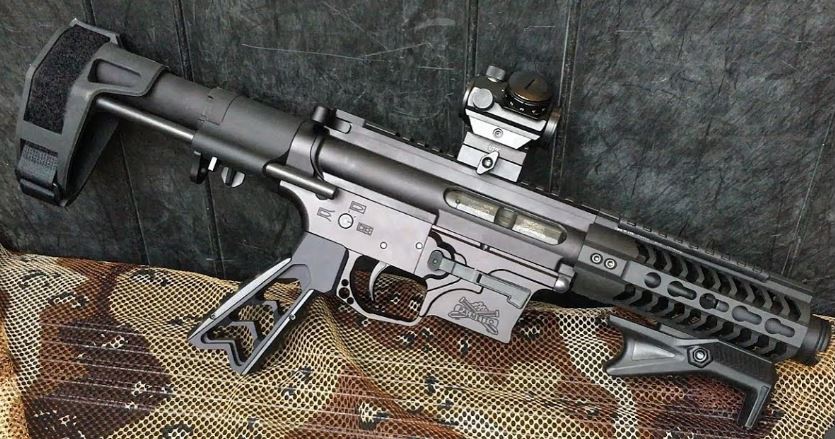
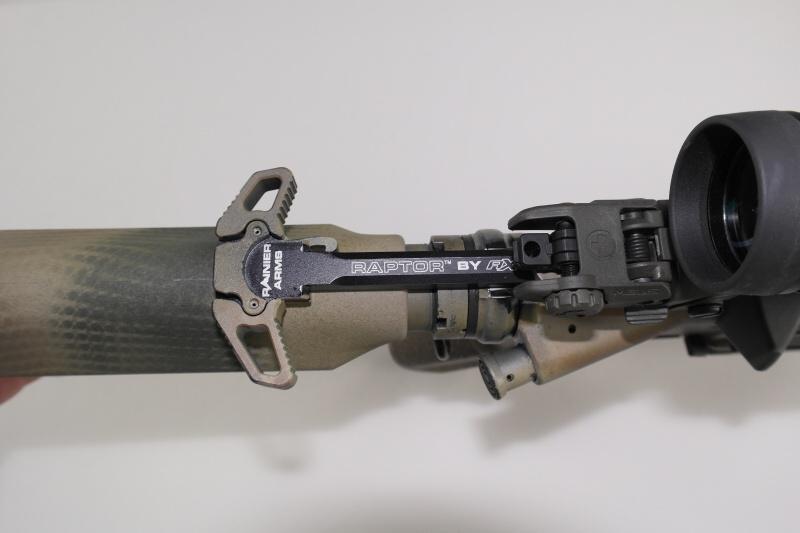
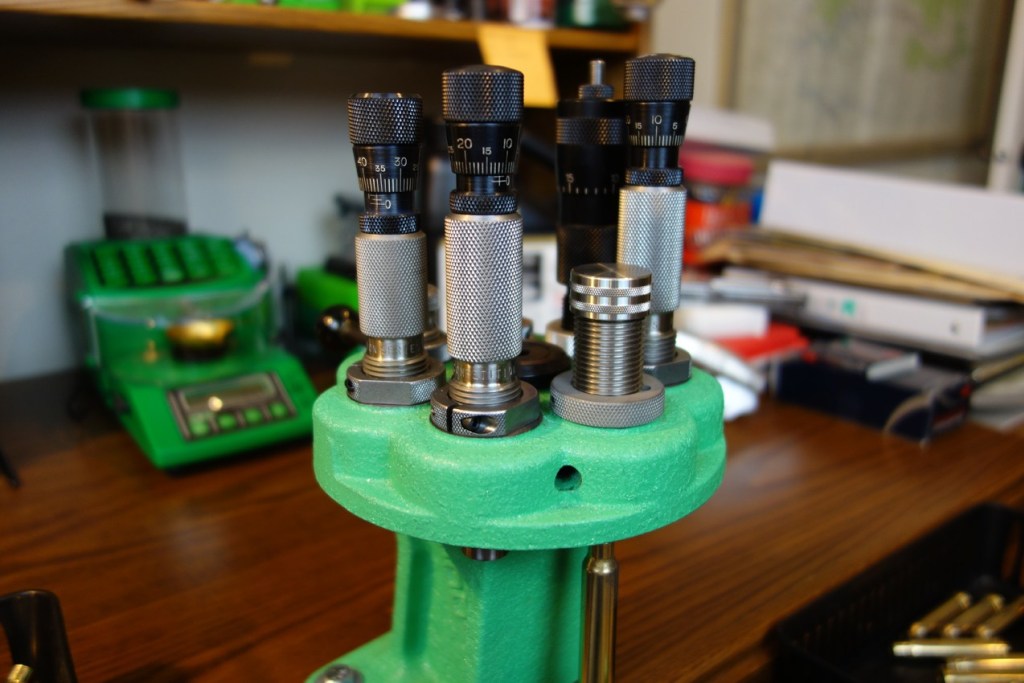
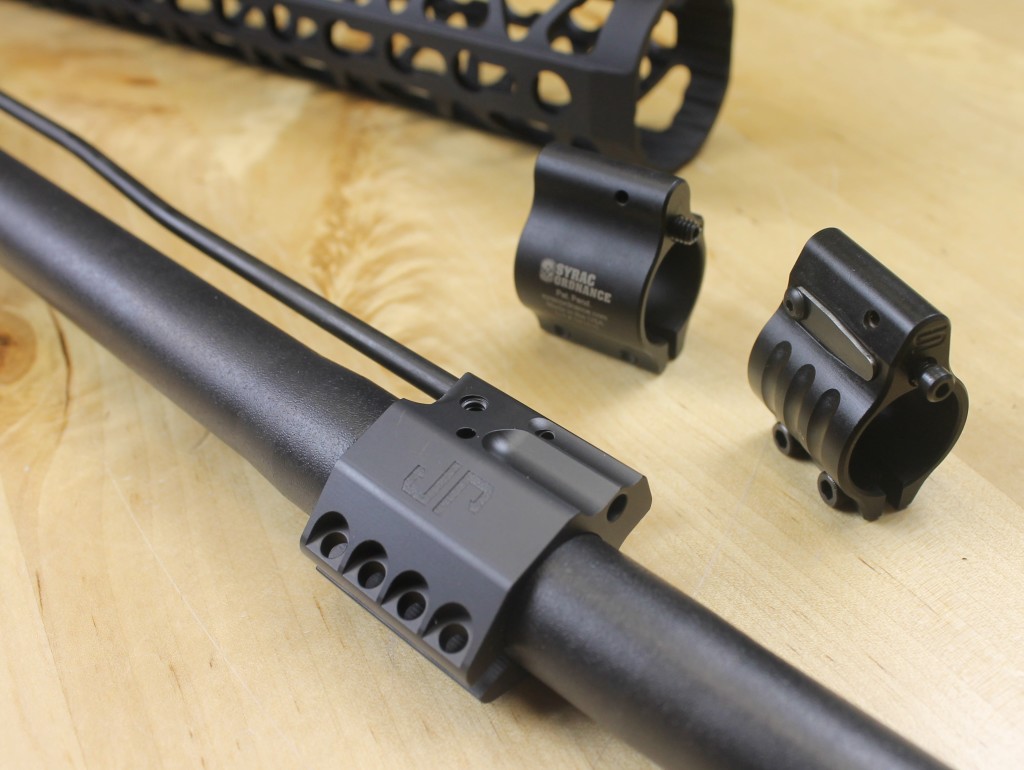
Well, I bought a HOLOSUN fully ENCLOSED circle/dot sight. It has many more features than the other fully enclosed red dot, the AIMPOiNT ACRO P1 AND a much lower price.
PARALLAX?? I don’t notice it on a pistol but might on a rifle.
But I got this sight for my RUGER 57 pistol that takes the little .22 caliber 5.7 x 28 NATO submachine gun cartridge used in the P90 sub gun (and my PS90 semi-auto version). It is a serious cartridge and is a decent defensive round.
I have found that the reticule of my EOTech comes into view earlier as I raise my gun Up to a firing position than with my red dot sights. Therefore, a holographic sight might enable slightly faster on-target sight alignment and shooting.